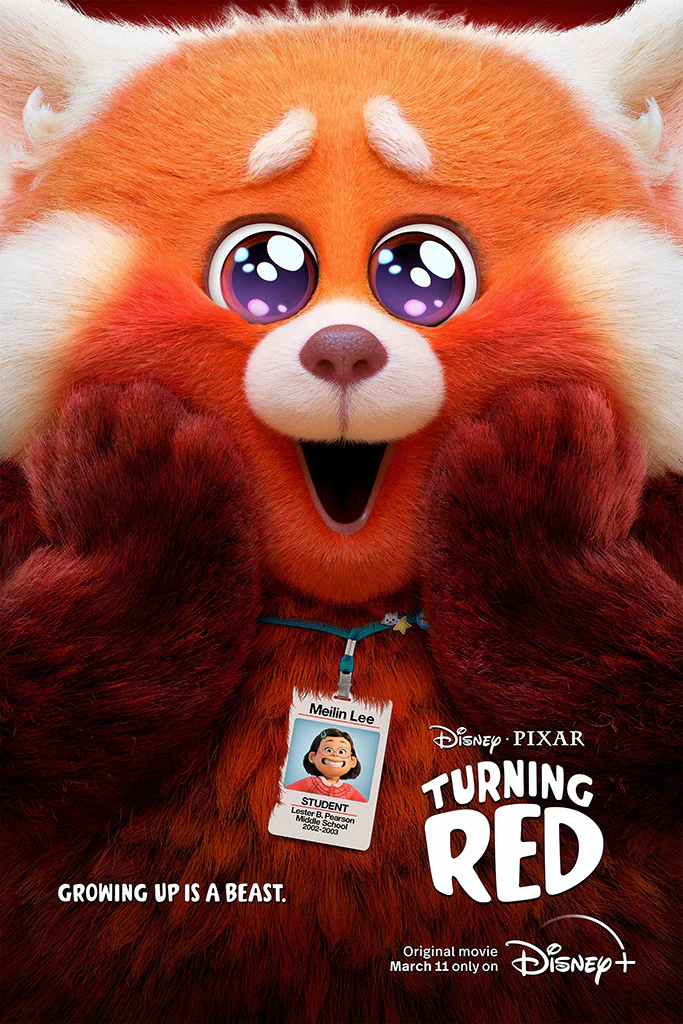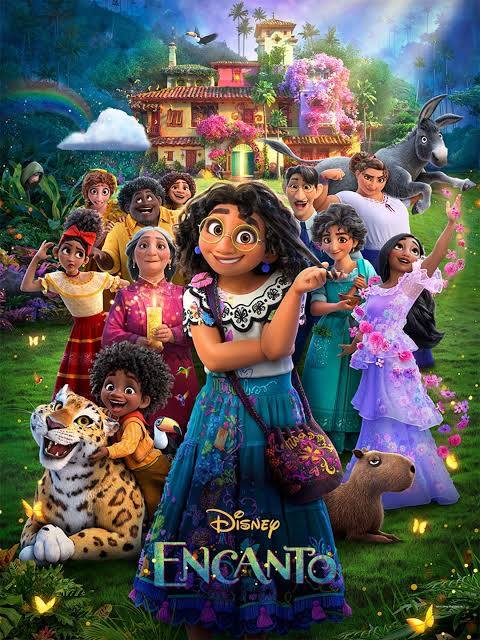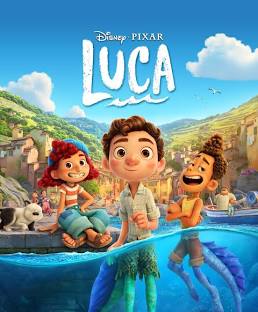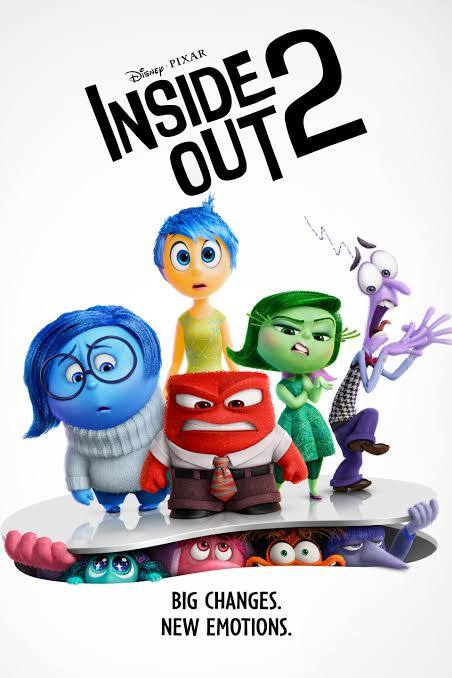
Turning Red

Credits
Released:
March 2022
Directed by:
Domee Shi
Starring:
Rosali Chiang
Sandra Oh
Maitreyi Ramakrishnan
Jordan Fisher
The first time I saw a teaser for this film I came away completely clueless about the plot and if I'm being honest the non-contextualised scene I viewed did not initially entice me into watching. So I was truly not prepared for what awaited me in the following 1-hour 40-minute run time. From the director of Pixar short Bao (2018) Domee Shi, Turning Red is a delightfully charming yet unapologetic film that delves into issues not often explored by mainstream animation.
Meilin is a 13-year-old girl entering puberty with a serious boyband crush and a potentially life-ruining ability to turn into a giant red panda. The ties between the physical transformation into the panda and the hormone fuelled phase of puberty is a genius correlation that also leads to some humorous double-meaning jokes. Ultimately the panda is a way of exploring not only the increase of societal pressures placed on young girls as they grow but the familial pressures experienced simultaneously that manifest into teenage angst and poor decision making. The cultural aspects of Meilin's Chinese upbringing are also an integral part of the story. As a white woman, I feel I cannot comment on the accuracy of its portrayal, but it is such a refreshing and welcomed departure from the typical coming-of-age setting we normally get in films that broach a similar subject matter.
The animation is flavourful and packed with energy. Being a Pixar film it has become expected to see beautiful animation but not only is Turning Red beautiful but it is full of personality. Most of the humour for me came in the form of visual animation gags and my partner can attest to my open guffaws, particularly during the explosive opening sequence. Unlike the 2022 Oscars would you believe this film is most certainly not just for kids. In fact, it tells such a complete and relatable tale of growing up as a 13-year-old girl that many adults will find themselves physically responding to many of the aspects of the story by laughing and cringing like myself. On top of this, the film is set in the early 2000s harking back to the director's own early teenage years so it is absolutely filled with nostalgia from mix CDs to Tamogotchis.
Speaking of cringe it would be remiss of me not to mention the biggest criticism of this film, that it is apparently too cringey and unrelatable as a story about a young Asian girl. We have finally gotten a film that reflects the type of stories that people who campaign for equality in the industry have been asking for. A story about women, by women. The script written by Julia Cho and Domee Shi reflects an accurate experience, not a fabrication or a palatable illusion. It's also not trying too hard with its feminism except perhaps a line Mei shouts to her mother towards the end "my panda, my choice." The men are not villains, in fact, the true antagonist of the story seems to be puberty coupled with a flavouring of intergenerational trauma. Those who do not think that this story cannot be enjoyed by anyone other than those who mirror the appearance of those who made it are ignorant at best.
I do want to quickly mention another film in this review that I believe began the journey that has gifted us Turning Red and that film is Brave. As I reflect on Brave it is becoming apparent that it was a movie clearly ahead of its time. Like Turning Red, it focused on a relationship between a mother and daughter and funnily enough also included animal transformation. Brenda Chapman was subsequently kicked off her own project when she and the studio's visions didn't align (For the full breakdown watch documentary Half The Picture). Yet here we are ten years later with the first solo female-directed animation from Pixar dealing with family pressures and large fluffy mammals. Merida walked so Meilin could fly, oh my, oh my.
Encanto

Credits
Released:
November 2021
Directed by:
Bryon Howard, Jared Bush
Starring:
Stephanie Beatriz
Jessica Darrow
John Leguizamo
Wilmer Valderrama
Encanto is the 60th film from Walt Disney Animation Studios, a huge milestone, but more impressive is the studio’s ability to pump out consistently entertaining and quality films that don’t feel lazy or cheap. The film continues the studios’s streak of subverting the Disney formula by avoiding a mustache-twirling villain and focusing on more ambitious themes. It doesn’t completely work, but it’s still worth watching.
The film follows Mirabel Madrigal (voiced by Stephanie Beatriz of Brooklyn Nine-Nine), a young woman living in a hidden village in the mountains of Columbia with her extended family. They include her Abuela Alma (Maria Cecilia Botero), who carries with her an enchanted candle that blessed the family with magical powers; her mother Julieta (Angie Cepeda), who can heal people with her food, and father Agustín (Wilmer Valderrama); sisters Isabela (Diane Guerrero), perfect in every way and who can make flowers appear out of nowhere, and Luisa (Jessica Darrow), who has the strength to lift houses; aunt Pepa (Carolina Gaitán), whose emotions affect the weather, and uncle Félix (Mauro Castillo); cousins Dolores (Adassa), who has supersonic hearing, Camilo (Rhenzy Feliz), who can shapeshift, and Antonio (Ravi-Cabot Conyers), who’s about to have his own ceremony to discover what power he’ll be gifted. Mirabel, unfortunately, is the only powerless family member, a shame she desperately tries to hide.
Encanto is the only Disney animated feature I can think of that centers around an extended family, a multigenerational household. The family members have a diverse range of skin tones and body shapes and sizes (gone are the days of skinny white princesses who all have the same face). They all have different personalities and relationships with one another, some are best friends, others can’t stand each other, like a real family! And like a real family, they have a dark secret—they have an estranged family member, Uncle Bruno, they no longer talk to nor talk about, almost like it’s taboo. It reminded me of my own family.
I have a big extended family (on my mom’s side) that I’m close to. My mom has over ten siblings, and each one has their own sets of kids, and those kids have their own kids. It’s a blessing we celebrate every year at our annual family reunions. Growing up, I always thought my family was perfect. But as I got older, I started realizing the flaws, drama, and issues that any family can relate to. Despite how close the family is, we still have estranged family members we never talk about, whether out of shame or guilt.
And, like my family, Mirabel is a child of refugees. In a standout scene, we learn Abuela escaped persecution with her husband when they were a young married couple. When her husband died during their escape, a miracle appeared in the form of the magical candle. Abuela made the ultimate sacrifice for a better life, like all refugees, which makes it hard for her children or grandchildren to voice their personal issues or deviate from their sense of duty to the family. Even the fact that Mirabel’s mother can heal through her cooking is something any child of refugees/immigrants will recognize. Again, it’s all so relatable, and I appreciate that the film tries to tackle such sensitive topics.
Luca

Credits
Released:
June 2021
Directed by:
Enrico Casarosa
Starring:
Jacob Tremblay
Jack Dylan Grazer
Emma Berman
Giacomo Gianniotti
Pixar’s “Luca,” an Italian-set animated fairy tale concerning two young sea monsters exploring an unknown human world, offers the studio’s hallmark visual splendor, yet fails to venture outside of safe waters. After story artist credits on big-time Pixar titles like “Ratatouille” and “Coco,” “Luca” serves as Enrico Casarosa’s first time in the director’s chair. Borrowing elements from “Finding Nemo” and “The Little Mermaid,” Casarosa’s film follows two young Italian sea “monsters,” Luca (Jacob Tremblay) and Alberto (Jack Dylan Grazer). The former spends his days shepherding the little fish populating his seabed village away from fishing boats. But at night, as he lies awake in his seaweed bed, he dreams of living on the surface.
Looming against his desires are his mother (Maya Rudolph) and father’s (Jim Gaffigan) fear from living by a human, sea-monster-hunting oceanfront village. Nevertheless, dry world affectations fall to the ocean floor: an alarm clock, a playing card, and a wrench. These items draw Luca closer to the surface. As does Alberto, an older, confident amphibian boy who now lives alone in a crumbling castle tower by the beach, and claims his father is temporarily traveling.
If you’re wondering how these creatures with fins, scales, and tails can could live on among humans without being discovered, writers Jesse Andrews (“Me and Earl and the Dying Girl”) and Mike Jones (“Soul”) have a tidy solution for that. Rather than an evil witch granting him a human appearance, a la “The Little Mermaid,” the sea monsters here can naturally, magically turn mortal. Their ability isn’t controllable, however, as touching water reverts their skin back to their real scaly exterior. But for Luca, such power dangles greater temptation over him.
Once on dry land, Alberto and Luca form a quick bond. They dream of buying a vespa and traveling the globe together. Their plans nearly come to a halt, however, when Luca’s frightful parents threaten to make him live his oddball Uncle Ugo (Sacha Baron Cohen, essentially using his Borat voice in a fish) in the trenches. Instead, Luca runs away with Alberto to the town of Portorosso. There, they come across Giulia (Emma Berman), a red-headed, independently minded tomboy with dreams of winning the Portorosso cup—a traditional Italian triathlon consisting of swimming, cycling, and eating pasta—and her one-armed, burly father Massimo (Marco Barricelli). In a bid to earn enough money to buy a Vespa, the boys pair with Giulia to win the cup away from the evil five-time champion Ercole Visconti (Saverio Raimondo) and his goons while an entire town lays a bounty for sea monsters on their heads.
The most distinct current coursing through “Luca” is freedom: that’s certainly what the Vespa represents, the ability to be unrestricted not just by sea, but by land too. The other thread winding around the folklorish narrative, however, is identity, or the people who truly are behind our public faces. The villainous Ercole is initially and seemingly well-loved, as though ripped from an Italian magazine. We soon discover that his love, somewhat like Gaston in “Beauty and the Beast” (another Disney flick attuned to true identities) actually rules through intimidation. The measured eroding of his care-free, buoyant persona into the narrative’s real monster is predictable yet satisfying.
Inside Out 2

Credits
Released:
June 2024
Directed by:
Kelsey Mann
Starring:
Maya Hawke
Ayo Edebiri
Amy Poehler
Tony Hale
Pixar movies have a way of pushing sentimental buttons and getting us in our feelings. Last weekend, I opened Disney Plus to stream Inside Out, a film I hadn't seen since I was a teenager. I chuckled at its cleverness and weighed its message about the need for unpleasant emotions, and by the end of it, I needed tissues. Rewatching 11-year-old Riley finally experience much-needed emotions reminded me why a sequel was well-earned. Is Inside Out 2 as moving as its predecessor, to the point that it'll bring the audience to tears?
Though this film didn't evoke the strong emotional response from me that the first one did, it delivered another sincere narrative that, combined with humor and stunning visuals, still won over this moviegoer. The sequel returns to Riley's mind and brings in more emotions that arise when she hits puberty. Riley is now 13 and her headquarters continue to hold the OG emotions of Joy (Amy Poehler), Sadness (Phyllis Smith), Anger (Lewis Black), Fear (Tony Hale, replacing Bill Hader) and Disgust (Liza Lapira, replacing Mindy Kaling). Riley is still into hockey and is starting to show early signs of being a cat person.
On the way to hockey camp, she gets some unexpected news that throws high school plans into uncertainty. Before Joy and her expressive posse know it, new emotions are in the mix, including Anxiety (voiced by Maya Hawke), an orange ringleader with wide eyes and untamable hair. Anxiety is able to wriggle Riley out of a problem Joy only amplified, and that's all she needs to see before determining that more of her -- and less of the first five emotions -- is necessary.
With Anxiety at the helm, teenage Riley shrinks herself to fit in with older hockey kids, especially the top player Valentina. She finds acceptance and comrades on the hockey rink but hides interests, swallows inedible protein bars, and drifts from her best friends.
Mirroring the essence of the first film, Inside Out 2's storyline finds the characters on a journey to return to headquarters to rescue Riley. Nothing beats the magic of experiencing for the first time the detailed world that lies within Riley, but the quest includes new stops, at a prisonlike place that holds Riley's secrets and in the back of her mind, which also happens to be where Joy has been chucking scores of Riley's bad memories. Between Anxiety's and Joy's meddling, there's quite a bit impacting their sporty, blonde host. Early on, an interesting new addition to the setting is introduced: Riley's system of beliefs. It connects to her sense of self, a structure of glowing, overlapping hoops in headquarters. Like the core memories before it, this statement piece is essential to the story.